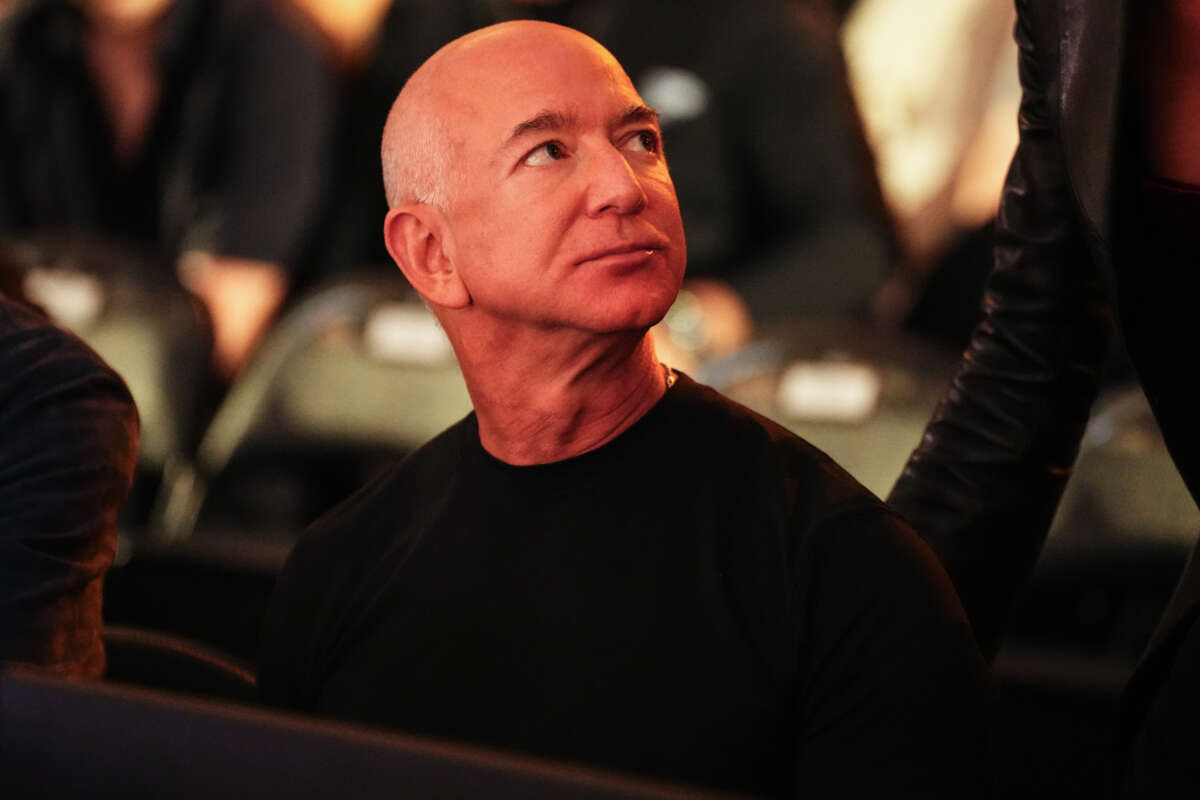Truthout is a vital news source and a living history of political struggle. If you think our work is valuable, support us with a donation of any size.
The publisher of The Washington Post announced Friday that the paper wouldn’t make an endorsement in the U.S. presidential race, with its newsroom reporting that the decision was made by billionaire owner Jeff Bezos, who intervened to stop a drafted endorsement of Vice President Kamala Harris, the Democratic nominee.
Publisher William Lewis wrote that the paper would return to its “roots” of not endorsing presidential candidates, which the paper didn’t do regularly until 1976. The decision came days after the Los Angeles Times owner, the billionaire Patrick Soon-Shiong, also reportedly blocked a planned endorsement of Harris.
The Washington Post Guild, a union, condemned Bezos’ decision in a statement on social media, arguing that it was an abdication of responsibility and suggesting that “management interfered with our members in editorial.”
Karen Attiah, a Post columnist, called the decision an “an absolute stab in the back,” writing on social media.
“What an insult to those of us who have literally put our careers and lives on the line to call out threats to human rights and democracy,” she wrote.
Martin “Marty” Baron, a former executive editor at the Post who was lauded for his leadership of the paper from 2012 to 2021, also denounced the decision not to endorse a presidential candidate.
“This is cowardice, with democracy as its casualty. Donald Trump will see this as an invitation to further intimidate owner Jeff Bezos (and others),” he wrote on social media. “Disturbing spinelessness at an institution famed for courage.”
The Post has endorsed the Democratic nominee for president in every race since 1976, aside from 1988, when it made no endorsement. The Los Angeles Times didn’t issue endorsements for decades but has endorsed the Democrat in each of the past four presidential elections, starting in 2008.
Lewis said the Post would no longer make presidential endorsements and emphasized its commitment to independent, nonpartisan news. He cited editorial board decisions not to endorse in 1960 and 1972, which gave similar rationales.
Lewis was previously the publisher at The Wall Street Journal, which is owned by right-wing billionaire Rupert Murdoch. Lewis’ tenure at the Post, which began last year, has been plagued by controversy.
The reasons for Bezos’ reported intervention to stop a planned Harris endorsement are not clear, but he has told the paper’s leaders that he would like them to seek out more conservative readers and add more conservative opinion columnists, according to The New York Times.
Some observers have suggested that Bezos, the founder of Amazon, and Soon-Shiong, a biotech mogul, are afraid to antagonize Trump for fear he could retaliate against their businesses when in office.
“The most serious allegation… is that Soon-Shiong and Bezos are trying to hedge their bets out of fear that their business interests could be harmed during a second Trump presidency,” Columbia Journalism Review’s Sewall Chan, who has worked at both the Post and the Los Angeles Times, wrote on Friday.
“Soon-Shiong, who made his fortune as a biopharmaceutical innovator, is working on new drugs that would presumably require FDA approval,” Chan continued. “Amazon faces an antitrust lawsuit, brought last year by the Biden administration, that will take years to litigate or settle.”
Robert Kagan, a neoconservative columnist and editor at large at the Post, resigned in protest on Friday, Semafor reported, while suggesting there may be further resignations.
“People are shocked, furious, surprised,” an unnamed editorial board member told Semafor about the endorsement decision. “If you don’t have the balls to own a newspaper, don’t.”
Other major newspapers have endorsed Harris, including The Philadelphia Inquirer on Friday — with the reminder that “the road to the White House may well run through Pennsylvania and every vote matters.” Will Bunch, a columnist at the paper, wrote on social media that “unlike some other news organizations, we will not be silenced, not when everything is on the line for democracy.”
The New York Times endorsed Harris on September 30, calling Trump “morally unfit” and “temperamentally unfit” for office.
A terrifying moment. We appeal for your support.
In the last weeks, we have witnessed an authoritarian assault on communities in Minnesota and across the nation.
The need for truthful, grassroots reporting is urgent at this cataclysmic historical moment. Yet, Trump-aligned billionaires and other allies have taken over many legacy media outlets — the culmination of a decades-long campaign to place control of the narrative into the hands of the political right.
We refuse to let Trump’s blatant propaganda machine go unchecked. Untethered to corporate ownership or advertisers, Truthout remains fearless in our reporting and our determination to use journalism as a tool for justice.
But we need your help just to fund our basic expenses. Over 80 percent of Truthout’s funding comes from small individual donations from our community of readers, and over a third of our total budget is supported by recurring monthly donors.
Truthout has launched a fundraiser to add 500 new monthly donors in the next 10 days. Whether you can make a small monthly donation or a larger one-time gift, Truthout only works with your support.
